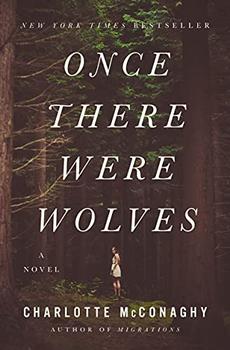Summary | Excerpt | Reading Guide | Reviews | Beyond the Book | Readalikes | Genres & Themes | Author Bio

Turning back for the truck, I say, "No names. She's Number Six."
* * *
Not long ago, not in the grand scheme of things, this forest was not small and sparse but strong and bursting with life. Lush with rowan trees, aspen, birch, juniper and oak, it stretched itself across a vast swathe of land, coloring Scotland's now-bare hills, providing food and shelter to all manner of untamed thing.
And within these roots and trunks and canopies, there ran wolves.
Today, wolves once again walk upon this ground, which has not seen their kind in hundreds of years. Does something in their bodies remember this land, as it remembers them? It knows them well; it has been waiting for them to wake it from its long slumber.
* * *
We spend all day carrying the remaining wolves to their pens, and return as evening falls to the project base camp, a small stone cabin at the edge of the woods. The others drink sparkling wine in the kitchenette to celebrate our having released all fourteen gray wolves into their three acclimation pens. But they aren't free yet, our wolves, the experiment has barely begun. I sit apart at the computer monitors and watch the feed from the cameras in the pens, wondering what they think of this new home. A forest not dissimilar to the one they came from in British Columbia, though temperate instead of boreal. I too came from that forest, and know it will smell different, sound and look and feel different. If there is any one thing I know best about wolves, though, it's that they adapt. I hold my breath now as big Number Nine approaches delicate Number Six and her daughter. The females have dug a groove into the snow at the very back of the pen and hunker down, wary of Nine's advance. He towers over them, shades of gray and white and black, as glorious a wolf as I've ever seen. He places his head over the back of Six's neck in a sign of dominance and I feel, with exquisite vividness, his muzzle pressing onto the back of my neck. His soft fur tickles my skin, the heat of his breath brings bumps to my flesh. Number Six whines but stays down, showing her deference. I don't move; any sign of defiance and those jaws will close over my throat. He nips her on the ear and teeth sink into my lobe, startling my eyes closed. In the dark, the pain fades almost as quickly as it struck. I return to myself. And when I look again Nine has gone back to ignoring the females, pacing round the perimeter of the fence. If I watch, I will feel the cold of the snow on my bare feet with each of his steps but I don't, I'm already too close, my edges have forgotten themselves. So I look instead at the dark ceiling of the cabin, letting my pulse slow.
I am unlike most people. I move through life in a different way, with an entirely unique understanding of touch. Before I knew its name I knew this. To make sense of it, it is called a neurological condition. Mirror-touch synesthesia. My brain re-creates the sensory experiences of living creatures, of all people and even sometimes animals; if I see it I feel it, and for just a moment I am them, we are one and their pain or pleasure is my own. It can seem like magic and for a long time I thought it was, but really it's not so far removed from how other brains behave: the physiological response to witnessing someone's pain is a cringe, a recoil, a wince. We are hardwired for empathy. Once upon a time I took delight in feeling what others felt. Now the constant stream of sensory information exhausts me. Now I'd give anything to be cut free.
This project isn't going to work if I can't create distance between the wolves and me. I can't get lost in them, or I won't survive. The world is a dangerous place for wolves. Most of them will be dead soon.
Excerpted from Once There Were Wolves by Charlotte McConaghy. Copyright © 2021 by Charlotte McConaghy. Excerpted by permission of Flatiron Books. All rights reserved. No part of this excerpt may be reproduced or reprinted without permission in writing from the publisher.
Your guide toexceptional books
BookBrowse seeks out and recommends the best in contemporary fiction and nonfiction—books that not only engage and entertain but also deepen our understanding of ourselves and the world around us.